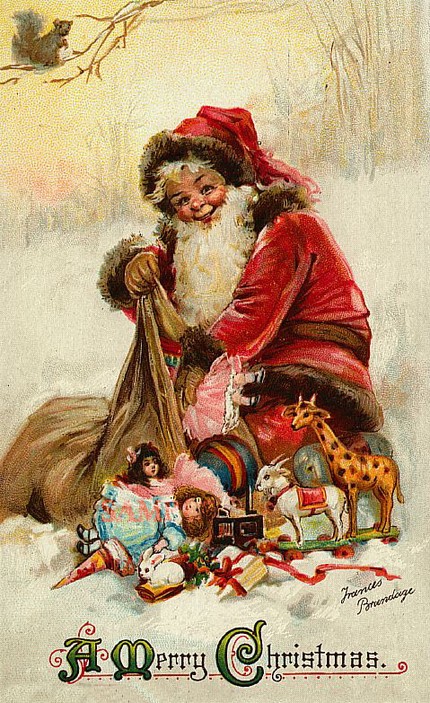For the next four weeks, children all over the world will be
hearing those words, "If you're not good, Santa won't come." I doubt
it makes any difference to behaviour. The problem with threats like these is
they're rarely (if ever) carried out. But it might just be making a difference
to how people think about possessions and worth.
Imagine a child called Trudy. At the ripe old age of 7,
Trudy has learnt that, no matter how badly behaved she is, those presents from
Santa still arrive on Christmas Day. Furthermore, she knows that Jenny from
next-door (also aged 7) usually gets less presents even though Jenny is a very
well-behaved child and Trudy can be quite naughty at times. What is Trudy to
make of this?
Or let's look at it from Jenny's perspective. She is told
that the same Santa Claus brings presents to everyone. Furthermore, she is told
that he only gives presents to the good girls or boys. So why is it that Trudy
gets more presents than her? I doubt she would say it to herself in these
terms, but on some subconscious level, might she not be wondering whether she
is less worthy than Trudy in some unknown way? If she believes the Santa
rhetoric, what else is she to think?
Let's fast-forward six years. Trudy and Jenny are now 13.
Their belief in Santa has gone, but the messages they heard about Santa are
still there. As any psychologist or counsellor knows, the messages we hear in
childhood can affect us long after we have grown up - even if we recognise that
those messages were false to begin with.
If you haven't already guessed, Trudy comes from a wealthier
family than Jenny. So while they may not be coming from Santa, Trudy still has
more and better possessions than Jenny does. Jenny knows it's not because Santa
has placed Trudy on the "good list". But maybe, deep down, she still
connects possessions to worth. Maybe she still feels like Trudy owns more
things because she is more deserving.
Jump another 10 years. Trudy and Jenny have moved out of
home and are sharing a flat together. Trudy finished uni and got a well-paid
job. Jenny also has a job, but it's not nearly as well-paid as Trudy's is. By
now, they've not only internalised the Santa message, but the many advertising
messages they have heard through their lives that tell them, either implicitly
or explicitly, that they should buy something because they deserve it.
Despite the fact that Trudy earns enough to save a little
money and use her money to help others and give to charities, she spends it all
on herself. Many of the things she buys, she will never even use. But that's
okay (in Trudy's mind). It makes her feel good. She's become her own Santa,
rewarding herself with possessions. The more things she owns, the more
deserving she feels.
Jenny also buys lots of things. But because she doesn't earn
as much money as Trudy, she puts it on credit. She is sliding further and
further into debt. But she considers it a small price to pay for the sense of
self-worth it gives her. She has finally made it onto Santa's "good
list".
Jenny was never any less worthy than Trudy. She only felt
that way because of what society told her. As adults we know that the amount of
presents Santa brings says nothing about how "good" that child is. So
how about we stop telling our children that. And how about we recognise the
Santa messages we ourselves have internalised - and do our very best to get rid
of them.
Our thinking about possessions and worth is damaging not
just to ourselves, but to the earth. In order for this to change (and it does
need to be changed) we first need to recognise how the messages we hear have
influenced the way we think about possessions and worth. It's only then that we
can get rid of them and replace them with something else. We need to come up
with a new message, one where Santa doesn't reward the "good" kids,
where we don't own things because we "deserve" them, but where a life
well-lived is its own reward.




